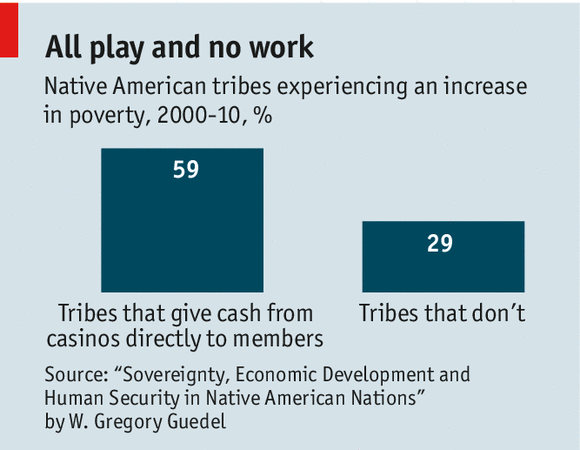We have a hypothesis: That Universal Basic Income would improve people's lives and most especially the lives of people living on the lower end of the socio-economic spectrum.
We choose some metrics like income levels of the bottom quintile and rates of substance abuse to use as proxies for more general outcomes.
Then we want to run an experiment.
We look for a sample to use as white mice. Because our hypothesis is that Universal Basic Income most helps to those on the lower end of the spectrum, we look for a sample that is near the bottom. Our thinking is that the advantages of UBI will not be diluted by other, extraneous factors. Any gains should be easiest to see and measure.
Casting about, we find a distinct population with:
- A per capita income that is 40% of the national average
- A poverty rate that is 400% of the national average
- Alcoholism related death rates that are 500% of the national average
Results:
...(T)he (samples') mean poverty rate rose from 25% to 29%. Some (samples) did worse: among the Siletz poverty jumped from 21.1% to 37.8%.
“These (casino) payments can be destructive because the more generous they become, the more people fall into the trap of not working,” says Ron Whitener, a law professor, tribal judge and a member of the Squaxin Island Tribe in Washington state. Of the 17 tribes in the study that handed casino profits directly to members, ten saw their poverty rates rise. Of the seven tribes that did not, only two saw such an increase
With free housing and health care, “a lot of people have figured out a way to use the system to survive,” he says. “Why get a job if you don’t need one?”
And from another source
Landry noted that when Southwestern tribes began making high oil-lease payouts, rates of alcoholism and deaths from accidents rose.
"We have a lot of young families," Landry said. "We've got kids having kids. We have teen-age parents. It's hard enough when you're that young with all the issues you're dealing with. You don't know how to save. You're not prepared to deal with it. We've seen it before in Indian country and it's never a healthy situation."
Conclusions:
- Many recipients of Universal Basic Income will increase their consumption of alcohol and other drugs. "Hey, I have the money and don't have to go to work in the morning."
- Many recipients of Universal Basic Income will either experience or be guilty of domestic violence fueled by alcohol, drugs and rage
- Many recipients of Universal Basic Income will not physically move as much and this will impact obesity, diabetes and heart disease rates
- Many recipients of Universal Basic Income will experience an economic failure-to-thrive
- Many recipients of Universal Basic Income will become locked into subsistence levels of living because they will disconnect from work, the engine that can pull them up
- Many recipients will pull income forward by buying products and services on "time". Often, those purchases are ill-considered. What good is a Winnebago when the payments do not leave you with enough money for gas? Net results...UBI is soaked up and recipient is in the same, dire straits as before.
- The children of people receiving Universal Basic Income will normalize that existence and the idea of "working" will be completely alien to them
Which do you trust: Empirical data .OR. self-reporting and anecdotal data.
Which is more important: Feeling good about ourselves .OR. helping people in ways that measurably improve their outcomes.

Personally it's measurably improving outcomes...
ReplyDelete